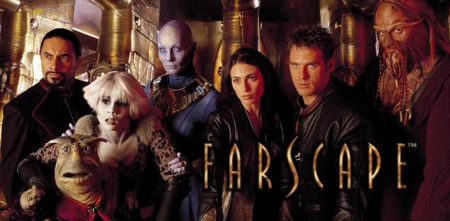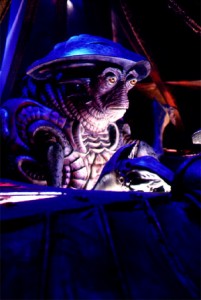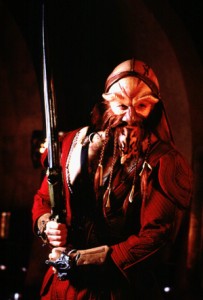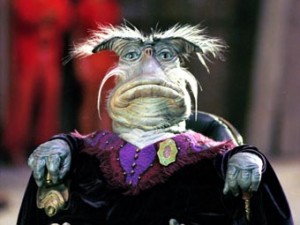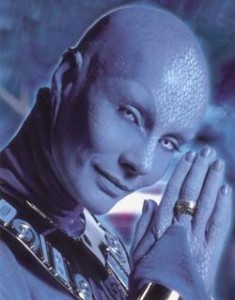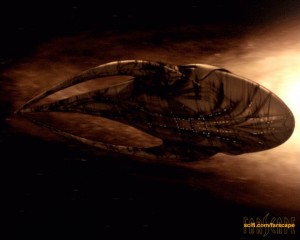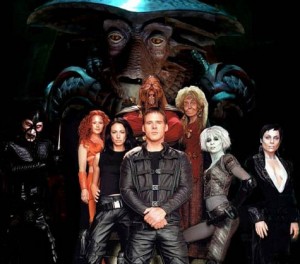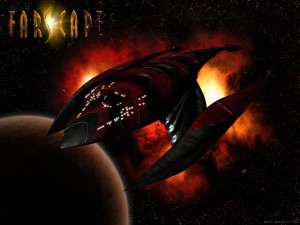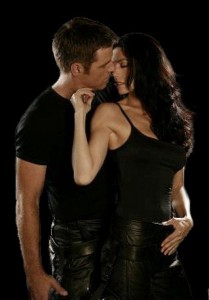Since the alphabet is the building block of our language, the Powet Alphabet is the building block of what makes us geeks.
Before the Sci Fi Channel (or “SyFy”, as it’s now known) decided it hated science fiction fans, it was dedicated to bringing original science fiction content to the masses. The network didn’t always do this well (see Mission: Genesis), but in the late ’90s it would do this often. The first original series to catch my eye that wasn’t a total bomb was Farscape.
Farscape tells the story of IASA scientist and astronaut John Crichton, who is flung unwittingly across space via wormhole to try to survive in a much more advanced society that, due to his many other misfortunes, finds excuses to seek his complete and utter destruction. In true Douglas Adams fashion, we quickly find that Earth (“never heard of it”) is a truly backwater planet, leaving our hero stuck in the middle just trying to figure out what’s going on. Unlike other protagonists stuck in this situation, however, Crichton is able to bring his full knowledge of year 2000-era science fiction pop culture to bear in order to make sense of the things happening around him, to him, and without him.
For these and many other reasons that we are about to explore, Farscape wasn’t just another run-of-the-mill low budget hack writer’s fantasy. It was a hack writer’s fantasy with heart, drama, love, death, and re-death. And lots of sci-fi in-jokes. Come with us as we explore the Powet Alphabet’s “F”.
…what, you expecting Famicom?
Farscape was the brainchild of Rockne S. O’bannon — creator of other familiar sci-fi properties such as Alien Nation and SeaQuest DSV — and Brian Henson — son to the late Jim Henson, and heir to his Creature Shop. The younger Henson used this company to particular effect in Farscape, creating virtually every alien species in the show, whether prosthetics on live actors or, more entertainingly the various muppets that tended to be much larger or smaller than the average person. These aren’t your daddy’s felt sock puppets, though — these creatures were wet, slimy, and usually not all that nice.
This look and feel wins high praise from this fan in particular, but also the actors who had the pleasure of interacting with the march of creatures that would grace the Farscape set. It was much easier to interact with a physical object than a piece of paper on a stick, or a guy in a green leotard covered in golf balls. They got plenty of practice, as two of these aliens were also main characters: Rygel the XVI, deposed leader of Hyneria with a penchant for larceny and overeating, and the largely-immobile (and simply LARGE) slug-like creature that pilots their (computer-generated) Leviation spaceship, Moya. Who is also alive, by the way.
The Characters
Everyone onboard, the ship included, is or was a prisoner. Well, almost everyone. After protagonist John Crichton emerges from his short wormhole trip, he finds himself in the middle of a heated space battle where Moya and her “cargo” are attempting an escape (given how the rest of the show goes, Crichton’s mere presence may have made this extraordinary feat possible). He is towed into the escaping ship, where we get our first glance at these otherwordly forms.
One is D’Argo, a Luxan warrior who (we would find out later) was falsely imprisoned for the murder of his wife (not a Luxan).
The aforementioned Rygel was deposed as Dominar of the Hynerian empire before your grandaddy was even born.
Who can forget Pa-u Zotoh Zhaan, a blue plant-lady priest? She, unlike the others, was actually imprisoned for a good reason: she was an unabashed terrorist (that is, until she found "Jesus" in prison, or whatever the blue plant-lady priest equivalent is).
The last humanoid-alien member of the crew (but certainly not least!), is a Peacekeeper Prowler jockey named Aeryn Sun. After being caught up in Moya’s escape (she was trying to shoot the ship down at the time), she has been deemed irreversibly contaminated by her time alone with these aliens, and is therefore on the run from her own people. Not exactly a prisoner, but it’s close enough.
(Actually, there are quite a few other characters that come and go over the four years of the show, but why rob you of the joy of discovering them for yourself?)
Moya herself is a prison transport, but — as she is under the thrall of the human-looking Sebaceans (known as Peacekeepers) — she also desires freedom, and finds it with these unlikely passengers.
That leaves John Crichton: scientist; astronaut from IASA, the international version of the USA’s NASA; sci-fi geek; and, more importantly, a scientist/astronaut sci-fi geek who can kick some major ass.
Great Sci Fi show, or greatest Sci Fi show?
All of these factors set this show apart from others of its ilk, especially those that had been airing on the Sci Fi Channel around the same time.
It’s not an ultra-utopian Star Trek future where everyone gets along in a spirit of cooperation and trades fake saccharin smiles and tells jokes that are only funny to the other characters in the show. Nor is it the dystopian galaxy of Star Wars, where there is a clear good guy (the rebels) and a clear bad guy (the Empire, and the dude dressed all in black).
Instead a bunch of nobodies have to make their way through a harsh political climate of many warring factions, where social lines have been drawn for tectonic ages, backstabbing and selfishness are common, and even the “good guys” can’t be entirely trusted. So these escaped prisoners run to the Uncharted Territories — not to find others sympathetic with their plight to live in peace an harmony, but to get the hell away from giant capital ships and, like everyone else there, hopefully be left the frell alone.
Frak Frell YOU!
That’s another thing: the Bowdlerized profanity. Some find it distracting. Others find it cute. After a while I don’t even hear words like “dren”, “mivonks”, or “hezmana”. Fans of other shows like Battlestar Galactica are familiar with this sort of frakking language, but at least in the world of Farscape with its aliens and alien body parts and alien religions (even though they should be able to understand each other through their universal-microbe-babelfish translators), it makes much more sense. Just in case you need a refresher course, there is this lovely site.
But, oh, SO GOOD…
One of the greatest aspects of this show was that Crichton’s journey is also our journey as an audience. As he assimilates to his new role, he slowly removes the trappings of his Earth life — first ditching his tan astronaut jumpsuit in favor of Peacekeeper leather clothing to impersonate a member of the species for which he is constantly mistaken. My, god the LEATHER…
More importantly, its most endearing trait was that it could take existing sci fi fare and do it with a remarkable and entertaining twist. We’re not talking “Bruce Willis was a ghost the whole time” twist, just different perspectives on tried-and-true formulae.
In Farscape, switching bodies with Aeryn Sun means checking out her rack, since her mind’s not around to stop you. It means that villains can become allies, and even heroes in their own right. It means that when the bad guy puts a chip in your brain, and a copy of said bad guy is roaming your subconscious, you actually become believably unhinged. It means when a main character is inexplicably “twinned” in possibly one of the worst episodes of the series, the serialized nature of the show means the consequences are far-reaching, and become possibly one of the best story arcs about identity and heroism I have seen on any show ever. It also means you can kill off one of these copies, and go through the emotional range of what that would mean for the characters… but the next week he’s still there, and being treated unfairly like the walking dead.
What show other than Farscape could do all that?
Cancellation
The show ran for four seasons to much acclaim: two nominations for Saturn Awards in 1999, two wins of Saturn awards in the years to follow, and three more nominations in 2002.
Ah, 2002. The year Firefly was canceled? Sure, but also the year Farscape was canceled, and canceled first.
Science fiction shows get canceled all the time, and — spurred by the twice fan-saved original Star Trek series — fans of these shows feel like they can beat back the tide. Sometimes they are right (only to have it canceled again: see Star Trek, etc.). Sometimes it leads to transformation of other media, or at least an acceptable capstone to the show that never got one. Farscape’s situation was a bit more unique than others.
Coming off a very popular and well-received third season, the Sci Fi Channel made the impressive yet unusual step of renewing the show for two full seasons. However, this is a network that hates to spend very much money on any of its productions. At the same time, Stargate SG-1 was just wrapping its six-season run on premium cable, and for some reason Sci Fi snatched it up to run concurrently with the fourth season of Farscape.
For a while, ratings were pretty close, but ultimately Farscape finished second. This wouldn’t be be so bad, except the Sci Fi Channel also has a penchant for canceling its #2 shows. And, surprise surprise, Stargate was cheaper to produce. So, despite its contractual obligation for a fifth season, the boom was lowered on the show as they were wrapping up filming on the final episode of season 4.
(Hopefully Firefly fans can forgive me for not being as concerned about their show when, a few months later, its cancelation on Fox was announced as well. I hadn’t even seen their intermittently-aired, brand new, only-showed-a-handful-of-episodes cowboy space western network drama that hadn’t had a chance to prove itself. I was promised more Farscape, and by the Gods I was going to get it.)
It was a perfect storm: the presence of Stargate was an economic imperative to ax the network’s most expensive show. The fact that it was no longer the most popular (not by much) made the decision supposedly easier. It didn’t help that the European backers to the show backed out (for lack of a better term), which would have left Sci Fi with the entire bill. Brian Henson campaigned furiously to let the show finish, as promised. All to no avail.
So what about that promised fifth season? Why didn’t the Sci Fi Channel get nailed for breach of contract? The network pulled the clever trick of airing “summer” and “winter” seasons of all its shows that year. In all of its press releases, this terminology would be used. When the second half of the fourth season of Farscape aired in early 2003, it was touted as “the final season”, despite that all the episodes were produced as a single, full television season. Sci Fi would carry on this practice for several more years on several other shows (including Battlestar Galactica, which would air its pilot miniseries later that year). If I had to guess (and I do), I would say it was to lend legitimacy to their practice, and get away scott-free with denying their contractual obligations.
The Peacekeeper Wars
However, the outcry was so widespread, and Brian Henson’s rage so great, that he acquired the rights to Farscape in order to give the show a proper sendoff. What resulted was The Peacekeeper Wars, four hours and two “movies” of acceptable length that did everything it could to abridge plots from the unfilmed (but partly-written) fifth season and have it make sense given the time limits. At the very least, the cliffhanger of the “final” episode was resolved.
The Future
The future of Farscape is very uncertain. Brian Henson has been making noise about a movie or webisodes — so far to no avail. Instead, so far, we got the Peacekeeper Wars. More recently are a set of comic book miniseries (all the better to collect into trade paperbacks) that are supposedly in continuity with the oft-promised webisodes. If nothing else, Farscape fans have new material that picks up where Peacekeeper Wars left off.
And for those new to the show (or existing fans who haven’t seen it in a while), Farscape is coming back to DVD courtesy of the A&E Network. On November 17, 2009, they will release a complete DVD box set — sans Peacekeeper Wars, thanks to Lions Gate holding the rights.
Until then, read those comics, and reminisce with us by replying to this post, or in our forums, about the greatness that was Farscape.
